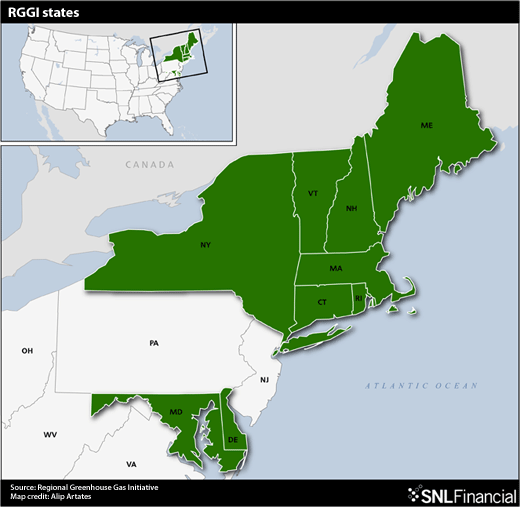Virginia’s participation in the Regional Greenhouse Gas Initiative (RGGI), which would require the state’s utilities to pay a carbon tax on their fossil fuel power plants and to reduce operation of those plants, might cost the ratepayers of Dominion Energy Virginia $3.3 to $5.9 billion over the first decade, according to a State Corporation Commission staff estimate.
During a House of Delegates subcommittee hearing a week ago, a member of the SCC staff told legislators that joining RGGI would add $7 to $12 to the monthly bill of residential customers. He provided no details that day and a request to the SCC’s communications staff didn’t produce clarity.
More details of impact on Dominion customers surfaced in a letter dated January 29 answering Delegate Terry Kilgore’s questions following up the cryptic comment. Kilgore chairs the House Commerce and Labor Committee, which killed the bill which had prompted the question about cost. House Bill 2735 would have allocated revenues from the carbon tax to various programs in Virginia, but never did designate how much money was involved. That would depend on the price of carbon credits in future auctions.
Another bill dealing with Virginia membership in RGGI, House Bill 2611, passed the House of Delegates Wednesday on a straight party-line vote, and is now heading to the Senate. That bill requires legislative approval before Virginia gets into RGGI, and previous versions have been vetoed by Governors Terry McAuliffe and Ralph Northam. Virginia is preparing to participate in RGGI through an Air Pollution Control Board regulatory process with no legislative approval. A new public comment period opens February 4.
The fiscal impact statement on House Bill 2611 cites Department of Environmental Quality estimates of $65 million a year in impact, at least at the start. Under the proposed regulation pending at the Air Pollution Control Board the two utilities would be capped at 28 million tons of emitted CO2 in 2020, with the cap shrinking 3 percent a year.
The fiscal impact statement also claimed that 95 percent of the revenue from the carbon tax would flow back to ratepayers through the fuel factor. The most recent RGGI auction set a tax of just above $5 per ton, placing the estimated cost of the 28 million tons allowed the utilities at about $15o million.
What the letter implies, but doesn’t state directly, is that payments for carbon credits in the cap and trade auction are not the only major cost to customers under RGGI.
RGGI’s declining emissions cap is on generation within the state, whether the power being produced is used in the state or dispatched to others through the regional transmission organization PJM. The other states covered in RGGI do not have integrated utilities like Dominion, meaning they do not own their own generation. Because Dominion owns the fossil fuel plants in question, disruptions to their costs or operations become the ratepayers’ problem.
“Dominion’s customers continue to pay for DEV’s generation resources whether a unit runs or not or is taken out of service due to RGGI compliance,” the letter states. It is signed by Director of Public Utility Regulation William Stephens. Later he writes: “RGGI compliance increases the dispatch cost of fossil fuel generation thereby making it less competitive. As a result, such generation will run less or be taken out of service….”
Those generation-related costs above and beyond the price of the carbon credits are seldom mentioned, but if Dominion’s fleet of plants can’t sell power at a competitive cost into PJM, that falls back on customers as lost revenue and stranded assets. If some plant shuts down, clearly the goal of RGGI proponents, the utility still recovers its costs for that idle plant from ratepayers.
There is no mention in the letter of costs on Appalachian Power Company or its customers. The SCC’s Dominion estimate used the price floor for carbon emission allowances published by RGGI and Dominion’s current cost of capital. It assumes that Dominion complies by going ahead with the 5,000 megawatts of solar, 30 megawatts or storage and $870 million of spending on energy efficiency programs in the 2018 energy regulation package approved by the General Assembly.
The letter indicates the lower cost of $3.3 billion over ten years is triggered by linking to RGGI and its auction process, with the higher cost of $5.9 imposed if Virginia takes full membership. It is not clear why the difference, or whether the costs include the capital costs of those new projects in the 2018 legislation along.
With the General Assembly providing so many incentives (carrots) for new renewable generation, it not quite clear what Virginia gains from the tax and cap scheme of RGGI (a very big stick.)
The letter raises as many questions as it answers, will be vigorously disputed, and a full understanding will require some explanation from the commission staff. The opportunity may arise as the House bill comes up in a Senate committee in the next weeks. As previously noted here on Bacon’s Rebellion, the carbon tax is just one of several things pending likely to add costs to Dominion customers, with the coal ash settlement being the other major new charge.

